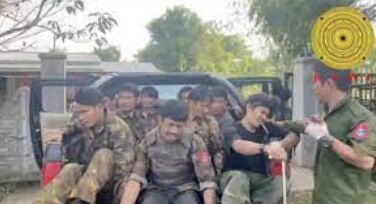Renewed Clashes in Myanmar's Rakhine State Displace 26,000 People: Urgent International Action Needed
Renewed fighting between Myanmar's military and the Arakan Army has resulted in the displacement of over 26,000 people, causing concern for the safety and well-being of the affected population. Humanitarian aid delivery has been severely disrupted. Immediate action is needed.
Renewed fighting between Myanmar's military and the Arakan Army (AA) has led to the displacement of over 26,000 people in western Rakhine state, according to the United Nations Office for the Coordination of Humanitarian Affairs (UNOCHA). The clashes between the two groups began on Monday when the AA launched attacks on security forces in Rakhine and neighbouring Chin state, breaking a shaky ceasefire.
Local media outlets Western News & Narinjara report that #Myanmar junta helicopters fired airstrikes into Pauktaw, Rakhine State this morning. Footage indicates heavy gunfire.
— Emily Fishbein (@EmilyFishbein11) November 16, 2023
Yesterday, Arakan Army forces took over the Pauktaw police station according to Narinjara (1/2) pic.twitter.com/6Zhv5iaP5e
Since then, there have been reports of military shelling of AA positions, resulting in at least 11 deaths. The junta troops also shelled the town of Pauktaw and shot at it from helicopters after AA fighters briefly took over the police station. The conflict has escalated in the past two days, particularly in Pauktaw, Maungdaw, and Paletwa townships. The Myanmar Armed Forces (MAF) conducted an operation in Pauktaw with air and naval support to regain control after the AA temporarily seized the town. Reports indicate that the MAF has also shelled AA-controlled areas in several townships, resulting in casualties.
As a result of the ongoing conflict, the number of internally displaced persons (IDPs) in Rakhine and Paletwa has risen to approximately 90,000, with over 26,000 people newly displaced since the ceasefire broke. This adds to the existing displacement of 63,884 people affected by earlier conflicts between the AA and the MAF, along with approximately 150,000 predominantly Rohingya IDPs from past inter-communal tensions. The intensified fighting has had a significant impact on civilian movement and the delivery of humanitarian aid. Key transport routes and waterways have been restricted, making it difficult for aid organizations to reach affected areas. Humanitarian assistance has been suspended for several days, and access is limited due to the ongoing clashes.
The MAF and the State Administration Council (SAC) have also increased security measures, including the establishment of checkpoints and roadblocks, as well as conducting household searches. More than 100 people have been arrested by the MAF/SAC since the conflict began. The displacement of thousands of people and the disruption of humanitarian aid in Rakhine state is a cause for concern. The international community should take immediate action to address the escalating conflict and ensure the safety and well-being of the affected population.




